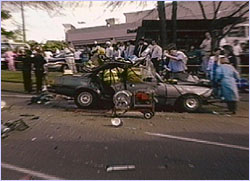
|
 |
 |
 Human Response
Human ResponseFire | Car | Plane | Ship Bleeding One of the most common emergencies related to car crashes is, of course, bleeding. There are several things that you can do to minimize damage before an emergency medical crew can reach you. A bleeding victim should be laid flat on her back with her feet raised. If possible, raise the wound above heart level. If you suspect a head, neck, or back injury, though, do not move the victim at all. Apply direct pressure to the wound with a clean cloth or with your hand. If bleeding still does not stop, apply pressure to an arterial pressure point while keeping direct pressure on the wound. When the bleeding stops, apply a bandage. Claustrophobia In some cases, accident victims will be stuck in a wrecked car for hours before an emergency crew can get them out. Some people in this situation will be susceptible to claustrophobia and will panic. If you have a tendency towards claustrophobia, you might consider carrying a small supply of valium at all times. This prescription drug alleviates panic from claustrophobia and is also very handy for airplane rides and in case of broken-down subway cars or elevators. Another option is to practice deep-breathing meditation, as described in books such as Zen Mind, Beginner's Mind. With practice, this technique can be a wonderful antidote to claustrophobic panic. Tetanus Tetanus is a dangerous nerve ailment caused by the toxin of a common bacterium, Clostridium tetani. Being cut by the body of an automobile is one of many ways to contract tetanus. Without treatment, tetanus can lead to sustained muscle spasms, including the infamous "lockjaw" and often death. If you're unable to wash the cut with soap and water, at least try to have an antiseptic or antibiotic ointment on hand at all times. Most importantly, though, be sure that you have had your tetanus vaccination followed by a booster shot at least every ten years. Tooth Avulsion Seat belts and airbags notwithstanding, a violent car crash sometimes results in teeth being knocked out—tooth avulsion. Even an adult's tooth that is knocked out can sometimes be reimplanted if it isn't broken, but only if you act quickly. If possible, handle the tooth by the crown only; do not rub or scrape it to clean it; gently rinse it if you have clean water available; and try to replace it in the socket and bite down gently on gauze or a moist cloth. If you can get to a dentist or hospital within two hours, your tooth might be saved. Other Cars Often the last thing that people think about in the wake of an automobile accident is the danger from other cars. Too often, people trying to fix or move their own car, or helpful motorists stopping to help others, are hit by other drivers who cannot see them. If possible after an accident, get your car well off the road as quickly as possible. Try not to stand too close to the road. It's a good idea to keep flares in your trunk, so that you can set them up to warn oncoming drivers. And keep in mind, especially on dark roads, that what seems like an obvious catastrophe to you may be nearly invisible to someone driving fast and expecting no trouble. Escape Through Time | Skydive | Human Response Survivor Stories | Pioneers of Survival | Survival Strategies Resources | Teacher's Guide | Transcripts | Site Map | Escape! Home Editor's Picks | Previous Sites | Join Us/E-mail | TV/Web Schedule About NOVA | Teachers | Site Map | Shop | Jobs | Search | To print PBS Online | NOVA Online | WGBH © | Updated November 2000 |